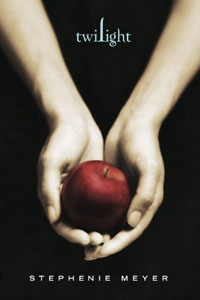Idolatry And Reading-Fandom
 I have a number of thought-threads running around in my head, and they all seem to be part of a tapestry, but I’m not sure I can see how they weave together.
I have a number of thought-threads running around in my head, and they all seem to be part of a tapestry, but I’m not sure I can see how they weave together.
First, I recently read an article entitled “Virgins and Vampire Worship: The Religion of Twilight” by Linda Kay Klein in which she claims that the “Twi-hard fan movement . . . is part of a widespread American trend away from organized religion and toward the sacralization of pop culture.”
She explains that statistics reveal people abandoning organized religion but not abandoning belief. Not all belief is directed toward God, however.
Religion scholar David Chidester has famously argued that baseball, Coca-Cola, rock ‘n’ roll, Tupperware—and even the Human Genome Project—serve, for their biggest fans, as “religious fakes,” meaning they play the role of religion, though they aren’t the real thing.
“Religious fakes” used to be called idols.
Certainly in the last half of the twentieth century and the opening decade-plus of the twenty-first, we’ve seen an inordinate fascination with and loyalty to an increasing number of people and things. We have Trekkies and Tea Partiers, the Raider Nation and cream-over-cookie Oreo lovers. The latter, a replacement of the “tastes great/less filling” beer wars of an earlier generation, may be tongue-in-cheek, but the close-minded devotion it depicts is serious.
Over the years we’ve seen the growth of celebrity worship, but of late we also see an increase in celebrity defamation as paparazzi chase the good, the bad, and the ugly in the lives of those whom fans venerate.
Perhaps this reality–that the people we would worship are human and not always admirable–has led to the worship of that which seems less fallible. Ideas such as freedom, tolerance, and peace now have some people’s ultimate devotion. Other people devote themselves to a sport or a team or a job.
Recently my pastor, Mike Erre, preached about this very subject. He defined worship as devotion and affection, whatever you prioritize as most important. With that understanding, everyone is a worshiper–elevating either the Creator to the place of highest priority or some part of creation.
You may recall that Spec Faith’s own Stephen Burnett did a series this past fall on Reading is Worship which I understood to mean reading is an act of worship. Fitted together with what my pastor said, then, reading is a reflection of that to which we are devoted.
 One last thread: along with the many other people and things about which our culture has become fanatic, we now have fictitious characters–Harry Potter, Edward, Bella, Katniss–and stories.
One last thread: along with the many other people and things about which our culture has become fanatic, we now have fictitious characters–Harry Potter, Edward, Bella, Katniss–and stories.
The frightening thing is, Scripture tells us we will become like that which we idolize.
Their idols are silver and gold,
The work of man’s hands.
They have mouths, but they cannot speak;
They have eyes, but they cannot see;
They have ears, but they cannot hear;
They have noses, but they cannot smell;
They have hands, but they cannot feel;
They have feet, but they cannot walk;
They cannot make a sound with their throat.
Those who make them will become like them,
Everyone who trusts in them. (Psalm 115:4-8 – emphasis mine)
If we idolize money (or the rich and famous), we become greedy. If we idolized sex (or the sexy), we become lustful, and so on.
Isaiah 44:9a adds another sobering caution:
Those who fashion a graven image are all of them futile, and their precious things are of no profit (emphasis mine)
In bringing this discussion back to reading, I’m trying to imagine a fan cult growing up around the characters of the classic fantasy stories. Would we ever see a Team Gandalf square off against a Team Aragon? Or a Team Frodo versus a Team Samwise Gamgee? How about a Team Lucy facing a Team Peter?
The idea seems absurd to me because Lord of the Rings and Narnia were bigger than the flawed and frail characters roaming through their pages. The characters don’t lend themselves to the kind of devotion we’ve seen in recent years–an ephemeral devotion that is white hot one day, then swept aside for the Next Big Thing.
 Yet, I think I understand why fans gravitate to fictitious characters. No one is going to dig up dirt about them. No one is going to snap a picture of them yelling at their three-year-old. They aren’t going to age or get fat. They can remain in our thinking as wonderful as we want them to be. They are, in fact, the idealization of a friend (Harry Potter) or lover (the Twilight trio) or advocate (Katniss).
Yet, I think I understand why fans gravitate to fictitious characters. No one is going to dig up dirt about them. No one is going to snap a picture of them yelling at their three-year-old. They aren’t going to age or get fat. They can remain in our thinking as wonderful as we want them to be. They are, in fact, the idealization of a friend (Harry Potter) or lover (the Twilight trio) or advocate (Katniss).
The problem is, we are idolizing the creature–and a fictitious creature, at that–not the Creator.
How easy it is to get caught up in Pop Culture trends. Yet the Christian is to be uniquely devoted to God. Can the two co-exist, and if so, what would that look like? Or must we resist being swept up in the frenzy of fanhood? I’m curious what you think.










































The scholar Peter Lowentrout posited twenty years ago that this phenomenon is called religious displacement–that like it or not, the religious “impulse” is there in most of us humans, and as was shown in the Soviet Union, for example, if citizens were forbidden to go to church, they would find their religious displacement in UFO cults, etc.
I don’t think it’s any accident that the most popular stories, by far, are fantasies of various types; if the only glimpse of the numinous people can get is by these films and books, people will flock to them. Christianity has, in mainstream culture, dwindled to nasty stories about child-molesting Catholic priests, the boringness of Sunday School, and “the true meaning of Christmas” . . . which is “family.” And maybe “Sharing.” Nothing about the birth of Christ.
Great comment, Sherwood. I’d never heard of religious displacement before. And that example from the Soviet Union is so telling. I also like your observation concerning the popularity of fantasy literature. I agree that it meets the longing of the human heart, if only by bringing that longing to the forefront. I’m reminded of the way a number of people reacted to Avatar, wanting so badly to go to the imagined world.
How much better if we Christians can give readers a taste of true spiritual things. You made astute comments about Christian fiction that offers little depth.
Becky
Both the article and the comment are brilliantly incisive and concise. What powerful thoughts!
Anne, thanks for your feedback. I’m glad this post sparked some discussion and thought.
Becky
I published a devotional on the parable of the sower recently on Amazon, titled, Hearing and Seeing God: Jesus’ How-To Manual Based on the Parable of the Sower. In the discussion on the seed that fell among the thorns, I brought out the point that the farmers would clear the land of both rocks and thorn bushes, and stack them by the side of the fields. During planting and harvesting seasons, they would camp out at the field. During the night, they would use the pulled thorn bushes as fuel for their camp fires.
What we tend to do is to use the field to grow the thorn bushes because we like the fire, instead of seeing them as a resource to aid in the growing of real fruit.
Balance is the key, as with any of this. Once it becomes an overwhelming obsession, it threatens to violate the greatest commandment, “Love the Lord your God with all your heart, mind, soul, and strength.” Or to put it in St. Paul’s words, you can’t serve two masters. One will dominate the other.
I think one can be in fandom to a degree, as long as a balance is kept, and the entertainment, characters, stories are used as a means to a valid end, and not the end itself. I think that has always been a big temptation among Christians, and the natural outcome of someone who has rejected Christ and religion as a guiding construct to their lives.
Doesn’t it also hold true that if we “idolize” love, we become more loving? Honor, and we become more honorable? Wonder, and we gain the ability to see that even our world is wonderful? I think this is the true function of fantasy. It actualizes things that are true but abstract. Maybe Philippians 4:8 has more to do with this concept than with blacklisting certain content from a Christian’s awareness.
Maybe I don’t understand pop culture enough to grasp what you’re really asking, but people can and have made idols out of The Lord of the Rings, at least:
According to Peter S. Beale, during the Hippy era “Frodo Lives!” was scrawled in the grafiti in New York subways. I think anyone who has ever read the last pages of The Return of the King can sympathize with the sentiment. Frodo sacrificed himself for the good of all, but he found no place for himself among the people that he saved, and he had to pass beyond into another kind of life. That is powerful, moving, and almost inherently religious.
Bainespal, idolizing virtues can only take us so far because we’ll be significantly lacking in other areas. My pastor’s point was that rather than idolizing anything we should worship Christ so we will become more Christ-like.
Regarding the Team Frodo stuff, I was mostly thinking that the characters, except for Aslan in Narnia weren’t the kind of heroes that would spark cult followings. However, as D. M. points out, people made cult followings of the authors. And of the world, at least in the case of Middle Earth. I think that’s largely what happened with Harry Potter, too. It wasn’t so much that readers were slavishly following Harry as if he was a rock star as it was that they loved the world within our world where magic was real.
Becky
Becky,
You’ve made a very interesting comment about idolising virtues. I had an illuminating discussion recently with a publisher for whom I occasionally work. We were talking about which of his authors I would be able to effectively work with as an editor. He was running through a list and got to one person about whom he said: ‘No, not a good idea. He’s got such extreme views about justice.’
I asked him, ‘Does he idolise justice?’
The publisher was taken aback. Finally he said, ‘Yes, that’s the word for it.’
So I told him my own story of how God had taken me to task for idolising particular virtues: honour, integrity, truth. They are part of His character, not all of Him.
Human beings are inveterate idol-makers. We’ll even split off aspects of God and make them into abstractions that we can worship, rather than work on the relationship.
Anne, that’s a good illustration. Yes, we’ll take aspects of God’s character and make that out to be the all in all. Even our Western culture which was fashioned by a Christian worldview has taken what Jesus said about loving our enemies and forgiving those who despitefully use us and turned it into the cult of tolerance and political correctness.
Becky
So, fandom = idolatry. But what about authors who are instructed to go forth and help create “tribes” and “fandoms” of readers to sell books? Is marketing inherently sinful?
Kessie, that’s an interesting question. I’m wondering if there aren’t levels of fandom. For example, I just read an essay about someone who was addicted to football (their words). I could relate because there have been times when I would put sports higher than things God has said–loving people being the most obvious. But does allowing God His rightful place mean I must have no part of sports? Can I learn to keep it in its proper place–not an idol, but something to enjoy?
Can we do that with marketing?
Becky
I just attempted to grapple with this concept in a blogpost.
http://netraptor.org/blog/2013/02/marketing-is-sinful-and-other-thoughts/
The only solution I can come up with is to stop being a Christian in order to sell books.
Marketing, essentially, is finding effective ways to say, “Look at what I’m selling! Come and buy it!” And how can that be sinful?
Except – there is always this caveat – in how you do it. Even then, it has always seemed to me the main moral danger is not idolatry but greed, deceit, and lack of charity. (Is it right to try to make people feel like they can’t live without something both expensive and not strictly necessary? I wouldn’t think so.)
Shannon, just to add to what you said, Paul says in Colossians that greed amounts to idolatry. And I think when we are trying to sell our stuff more than thinking of others, we might be putting ourselves on the throne that God should occupy.
I’m not saying people shouldn’t promote, but a lot of it goes to motive and heart attitude.
I always check CommentLuv, for example, which is a way of promoting my blog posts. But if I came in to comment only so I could do that, I’m have a wrong motive. My heart wouldn’t be right because I’d be operating from my own selfish goals rather than an honest desire to interact with other people and their ideas.
Becky
As a child of scifi-lovin’ hippies who were rescued into the Jesus Movement, I have to argue a couple points on this. Chief among them, YES, fandom frequently becomes idolatry. I’ll get to the Scriptural commentary on “why” in a minute.
The human mind is designed to believe. If we do not follow God, our innate need for faith will find another outlet and create an idol. The first idol we all create (and I think one of the hardest to eradicate in our justification process) is one of ourselves. We matter. Our feelings are important. This is a very thin, slippery line, because God does value us. But He doesn’t value our feelings first. We often do. And since much of our understanding of faith comes from what we espouse as children, that childish response of “But, I wanna…” is hard to capture and subjugate before Christ.
There once was a B-grade flick, The Ice Pirates,
Which needed a secret set of coordinates,
And any fools who followed
Without adhering to those hallows,
Stayed trapped in time, forever lost to us.
There is a very popular argument that it is enough to love the antrhopomorphized abstract. That seeing an aspect of God’s love, grace, forgiveness, etc. in a speculative story is enough to sanctify that speculative story. Edward is like Jesus in his absolute love for Bella, Harry is like Jesus in his calling to save the world, Samwise is like Jesus in his willingness to carry his friend. I really…don’t think so. We can get so caught up in trying to justify a story we love, that we forget the author of our faith. He doesn’t offer excuses, because there is no pandering of self for Him. God wasn’t kidding when he said in II Corinthians to cast down imaginations and to take captive every thought before Christ (paraphrasing, v. 10:5). There is a danger in elevating an imagined thing out of fantasy (of the imagination, not the specific genre) and raising it to the spiritual. Do we see spiritual parallels in fantasy stories? Yes. We should. But comparing two things doesn’t make them equal. We’re still supposed to take the comparison before the Lord and ask, “How now am I to think about this?”
But when we find that it’s more important to tickle our own ears with a story we can’t resist, it’s hard to hear the still small voice’s two cents.
Wow! That hits home. Thanks.
Oh, goodness, even if fandom isn’t a god in and of itself, trying to buy the things can become one so fast…I tried to buy Doctor Who DVDs on Ebay, and got so absolutely cross when I kept getting outbid…
being involved in an imported fandom is such an easy path to materialism, especially when one season will set you back $70.
I’d disagree on the idea that Tolkien or Lewis are immune to fandom cults. One of the issues I had when I struggled with my faith was the realization that I was a Lewisian before I was a Christian. Falling in love with the explainer rather than the thing explained. Tolkien isn’t much different, considering the temptation to fall in love with the baccy-smoking Front Porch Republic rural image of Middle Earth, or the geeky love of all things elvish.
It’s a tough thing.
Wow… me too. Nothing is meant to exist for its own sake, but all things when properly appreciated or understood point to the Source. As much as I love Lewis’s non-fiction and Tolkien’s fiction (as I’m sure we all do), when I start to think that the world could never be the same without them, I lose the true power of Lewis’s practical wisdom and the inspiring wonder of Tolkien’s sub-creation. Both are meant to point to something far beyond themselves, and if not seen that perspective, both become hollow and disappointing.
Specifically, I wrestle with despair because this world that I am condemned to live in seems so much less meaningful than the great fantasy worlds that I love. That is what happens when we love Middle Earth for its own sake, rather than for the echoes of God’s transcendence that it contains.
Amen, brother.
Lewis would call that “looking along the beam of light” rather than “… at the beam.”
It has also helped me to recall that Biblically, God has condemned this sinful age, not the physical world itself, the world we see and rightly enjoy. Even Lewis missed some of the implications of this, by having the “Platonic” (by name!) real Narnia supplant the “previous version” of Narnia in The Last Battle. (I love The Last Battle, but the story could have been helped by having all of Narnia “behind the door” somehow brought through the door and resurrected, just as all its good creatures.)
I was a Christian before I was a Lewisian. Coming at Lewis (and fantasy in general) from that direction poses unique challenges: the worlds of fantasy are much more appealing than the Biblical world. Narnia especially called to my heart in a way the Scriptures never did.
It took a long time to realise why. Tolkien talks about ‘the escape of the prisoner’ in defending fairytales against accusations of escapism. There’s a massive truth in that comment.
As I have studied more and more of Hebrew thought, I come across concepts that are so different many people struggle to understand them. I don’t – because those ideas are so familiar to me. I’ve met them in fantasy. I regard it as the last preserve in today’s world of an ancient worldview – it doesn’t precisely match that the Jewish way of thinking two millennia ago but it comes closer than anything else.
The appeal of fantasy is so strong, I believe, for just this reason. It has a spiritual component unmatched by other genres. Readers don’t want to escape from reality, they want to escape to it.
And this, for me, is the toughest aspect: to delight in the beauty and truth of fantasy at its best as it points to the Lord but not to be led astray by that same beauty and truth when it doesn’t. It’s a Perilous Realm, to be sure.
But outside it is the desert of modernity and materialism. The rock and the hard place.
And I forgot to mention: I have looked extensively into the connection between the name of a hero in fantasy, the author’s name, the concept of a True Name, name covenants in the Old & New Testaments as well as the Hebrew/fantasy link in my book, God’s Poetry: The Identity and Destiny Encoded in Your Name.
Recuperating is an otherworldly association with self.
Your blog on “Idolatry and Reading-Fandom” is truly captivating! Your insightful exploration of the intersection between idolatry and fandom in the context of literature is both thought-provoking and well-articulated. The way you seamlessly blend cultural analysis with a deep understanding of literary engagement makes for a compelling read. Keep up the excellent work in shedding light on the intricate dynamics that exist between readers and the literary idols they cherish. Your unique perspective adds a refreshing layer to the discussion, making your blog a standout in the realm of literary commentary.